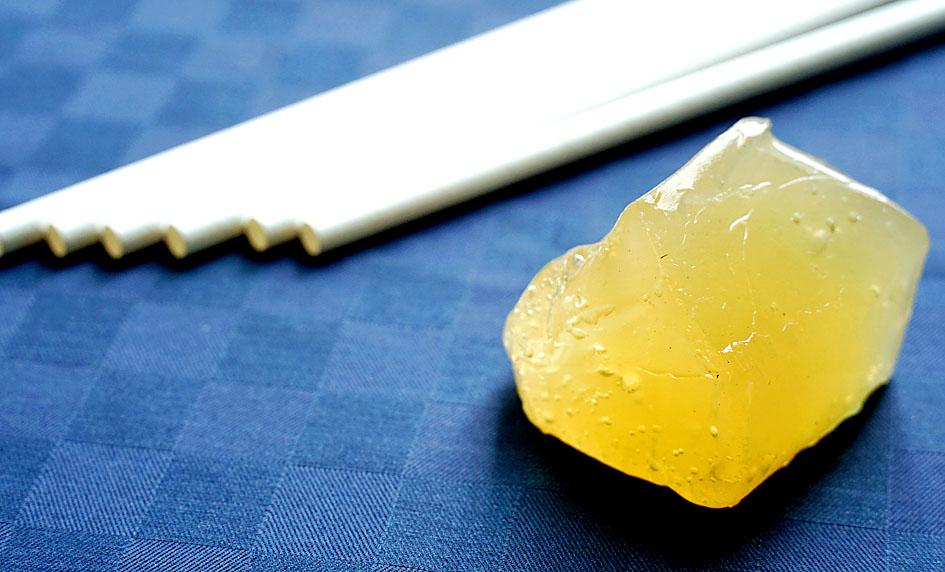The Industrial Technology Research Institute (ITRI, 工業技術研究院) yesterday said it has developed a new environmentally friendly hot-melt adhesive in conjunction with Tex Year Industries Inc (德淵企業).
The new biodegradable adhesive could be a vital component of future biodegradable plastic products, helping to reduce the environmental impact of plastics, the institute said.
The biodegradable adhesive, which has already received its product license, is planned to be turned into a commercial product by Tex Year, the largest maker of hot-melt adhesives in Taiwan, the institute said.

Photo courtesy of Industrial Technology Research Institute
The product should help Taiwanese plastic products go green, as required by an increasing number of large international companies, it added.
The institute’s polymer division and Tex Year began working together last year on the hot-melt adhesive using biodegradable plastic as the base ingredient rather than traditional petrochemical plastic.
The institute said the technical knowledge would be transferred to Tex Year for commercial utilization. The polymer division plans to work on other projects such as decomposing ocean plastic debris and creating other advancements in plastics, it added.
“The ITRI is actively helping Taiwanese industry develop a green supply chain and aid in Taiwan’s green industrial transformation,” said Lee Tzong-ming (李宗銘), deputy director-general of the Material and Chemical Research Laboratories at the ITRI.
In addition to being bio-degradable, the new glue’s special molecular structure design gives it excellent qualities as a hot-melt adhesive, Lee said. It melts at the 80°C, and “has excellent adhesive and durable properties,” he said.
Tex Year chairman Donald Hsiao (蕭向志) said the new adhesive can help clients who need to conform to new EU carbon tax regulations.
“We are the first company in Asia to receive certification from the German Institute for Standardization, and will soon receive our biodegradable and compostable certifications,” Hsiao said.

Sweeping policy changes under US Secretary of Health and Human Services Robert F. Kennedy Jr are having a chilling effect on vaccine makers as anti-vaccine rhetoric has turned into concrete changes in inoculation schedules and recommendations, investors and executives said. The administration of US President Donald Trump has in the past year upended vaccine recommendations, with the country last month ending its longstanding guidance that all children receive inoculations against flu, hepatitis A and other diseases. The unprecedented changes have led to diminished vaccine usage, hurt the investment case for some biotechs, and created a drag that would likely dent revenues and

Global semiconductor stocks advanced yesterday, as comments by Nvidia Corp chief executive officer Jensen Huang (黃仁勳) at Davos, Switzerland, helped reinforce investor enthusiasm for artificial intelligence (AI). Samsung Electronics Co gained as much as 5 percent to an all-time high, helping drive South Korea’s benchmark KOSPI above 5,000 for the first time. That came after the Philadelphia Semiconductor Index rose more than 3 percent to a fresh record on Wednesday, with a boost from Nvidia. The gains came amid broad risk-on trade after US President Donald Trump withdrew his threat of tariffs on some European nations over backing for Greenland. Huang further

Nvidia Corp’s GB300 platform is expected to account for 70 to 80 percent of global artificial intelligence (AI) server rack shipments this year, while adoption of its next-generation Vera Rubin 200 platform is to gradually gain momentum after the third quarter of the year, TrendForce Corp (集邦科技) said. Servers based on Nvidia’s GB300 chips entered mass production last quarter and they are expected to become the mainstay models for Taiwanese server manufacturers this year, Trendforce analyst Frank Kung (龔明德) said in an interview. This year is expected to be a breakout year for AI servers based on a variety of chips, as

HSBC Bank Taiwan Ltd (匯豐台灣商銀) and the Taiwan High Prosecutors Office recently signed a memorandum of understanding (MOU) to enhance cooperation on the suspicious transaction analysis mechanism. This landmark agreement makes HSBC the first foreign bank in Taiwan to establish such a partnership with the High Prosecutors Office, underscoring its commitment to active anti-fraud initiatives, financial inclusion, and the “Treating Customers Fairly” principle. Through this deep public-private collaboration, both parties aim to co-create a secure financial ecosystem via early warning detection and precise fraud prevention technologies. At the signing ceremony, HSBC Taiwan CEO and head of banking Adam Chen (陳志堅)